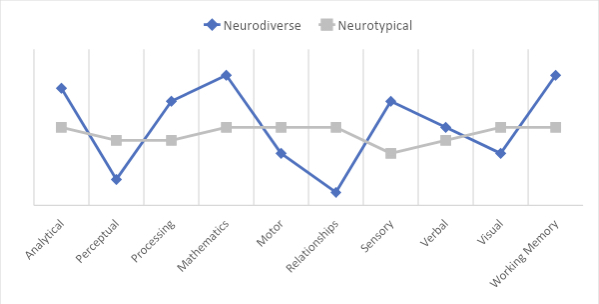How ‘spiky profiles’ can highlight the strengths of neurodiverse employees
Nearly 15% of the UK population is neurodivergent. There is an important opportunity to recognise those who are neurodivergent and spread awareness and information about the best ways to adapt working and learning environments to best support them.
By regularly updating the advice you give employees, you can ensure your workforce mental health policies are as effective and efficient as possible.
Traditional views of neurodiverse conditions, such as autism, ADHD, dyslexia and dyspraxia, are often linear, where an individual is perceived as ‘more able’ or ‘less able’ depending on their skills, abilities and how they interact with their surroundings.
However, this fails to recognise the strengths that neurodiverse individuals can have. A lack of knowledge or understanding can lead to non-inclusive environments and a negative perception of abilities that is not representative of true skills.
Where many ‘neurotypical’ individuals may perform generally average across the board (a ‘flat’ profile), neurodiverse individuals often excel in some areas, but find others more difficult. To fully employ the unique skills of neurodiverse individuals, it can be helpful to understand their abilities as a ‘spiky profile’.
Ups and downs of a spiky profile
Although everyone has variation in skills and abilities, having a spiky profile means this variation can be more pronounced for neurodiverse people, who have strengths in many areas but struggle with others. This means that their skill profile has peaks and valleys, rather than a consistent middle ground.
The variety of skill performance will look different for different individuals in different situations, so it is important that working environments foster inclusivity and offer flexibility for a range of working styles.

The skills and abilities that constitute a spiky profile can vary in terms of which areas are identified and examined, but often include:
- Analytical skills – how we solve problems by absorbing and analysing information
- Perceptual abilities – how we interpret and give meaning to what is happening around us
- Processing speed – how quickly we process and recall information from long-term memory
- Mathematical skills – how we interpret and make sense of numbers and time
- Motor skills – how we coordinate our body movements to complete tasks
- Relationships – how we develop and maintain social relationships
- Sensory sensitivities – our awareness and processing of sight, sound, taste, smell and touch
- Situational skills – how we interact and interpret different situations
- Verbal comprehension – how we communicate and understand speech and its meaning
- Visual perception – how we interpret our visual environment and surroundings
- Working memory – our short-term memory that assists us with decision making and problem solving
Each profile is unique and specific to an individual. For example, one person with an autistic spectrum condition may excel in mathematics and working memory but struggle with sensory overload and appear ‘clumsy’. Another autistic individual may have below average mathematical skills but exceptional motor skills and deal differently with stressful environments.
The benefits of a spikey approach
As well as identifying the areas in which certain individuals may excel or experience difficulty, a spiky profile approach can provide insight into preferred learning and work styles and help establish the most supportive environments. When these insights are shared with employers, they can be used to promote inclusive work and learning spaces that augment their strengths and remove barriers which may inhibit productivity, creativity, or wellbeing.
Workplace adaptations can include:
- Assessing the accessibility of job application processes to ensure interviews or assessments are inclusive to all learning styles
- The use of assistive technology such as text-to-speech, speech-to-text, and mind mapping software to aid expression, comprehension, and organisation
- Additional line management or pastoral support to regularly review strategies for maintaining healthy employee wellbeing
- Mentoring and coaching that is individualised for a diverse range of working styles
- Environmental adaptations to promote focus, concentration and memory, such as minimising noise and distractions
- Flexibility in expectations around working hours and location
- Giving individuals the opportunity to take a ‘spiky profile test’ so peers and employers can better understand each person’s unique skill set with a visual representation
- Increased awareness and understanding of general skill profiles among colleagues, peers and managers, allowing others to adapt their behaviours and communication styles
Understanding that there is no one-size-fits-all adaptation or support strategy is key to ensuring individuals are supported with dignity and compassion. Regardless of whether any individual has a formal diagnosis or not, using their skill profile to shape the support they receive can ensure strategies are personalised and effective.
Supplied by REBA Associate Member, Onebright
Onebright is a personalised on-demand mental healthcare company.








